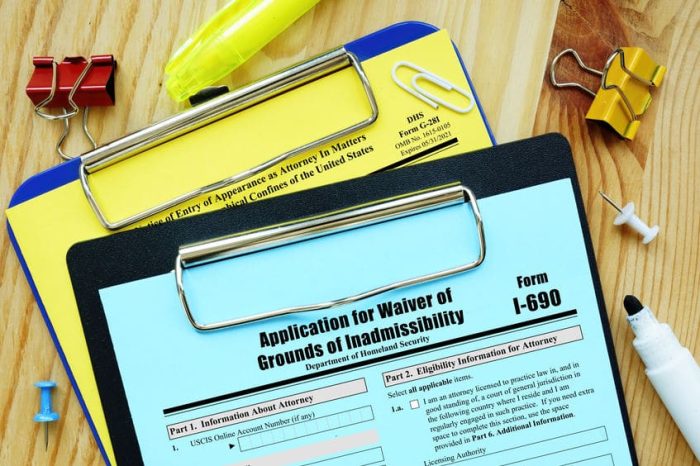Has USCIS denied your application for adjustment of status? Or has a US consular officer abroad denied your request for an immigrant visa? If so, you may be eligible for a waiver of grounds of inadmissibility by filing Form I-601.
Once granted, a waiver effectively pardons one or more factors (i.e. grounds of inadmissibility) that prevent you from entering or remaining in the United States.
Some of the most common grounds of inadmissibility include:
- Criminal activity
- Fraud
- Unlawful presence/overstaying a visa
- Illegal/undetected entry into the USA
- Alien smuggling
- A prior removal order
If you are denied admission to the USA on the basis that you are inadmissible on one or more of these grounds, you may be able to apply for a waiver of these grounds. If the waiver is granted, the grounds are essentially forgiven.
How to Obtain a Waiver Of Grounds Of Inadmissibility
You may be eligible for a waiver if we can establish that your qualifying relative (most commonly a parent or spouse who is a U.S. citizen or LPR) will experience “extreme hardship” if USCIS doesn’t approve the waiver.
To help you obtain a waiver, The Law Offices of Sethi and Mazaheri will prepare an extensive legal brief in addition to your 12-page waiver application. A legal brief is used for a wide variety of adversarial proceedings to explain why an applicant or respondent in a particular case should obtain a favorable outcome.
For the purposes of a waiver of grounds of inadmissibility, the brief will:
Outline your eligibility for the waiver;
Explain, in great detail, your immigration history; and
Include extensive documentary evidence that establishes how your qualifying relative would experience extreme hardship should the waiver not be granted.
Essentially, the brief must persuasively argue your eligibility for the waiver of grounds of inadmissibility. The comprehensive waiver packets our firm prepares for our clients typically take several weeks to months to complete, but this is truly the only way to obtain a grant on a waiver. To date, we have a 100% success rate on all the waivers submitted by our firm on behalf of our clients.
What Is Considered Extreme Hardship?
What constitutes “extreme hardship” is assessed from the following 5 standpoints:
- Health. Your qualifying relative may lose the ability to obtain ongoing or specialized treatment for a physical or mental condition. They may need help from you to manage this condition, and/or treatment in the foreign country is not sufficient.
- Financial circumstances. Your departure or inability to remain in the U.S. could result in loss of employment, end of a professional business or practice, declined standard of living, an inability to afford special education or other extraordinary needs for dependents, or an inability to afford medical care for sick or elderly family members.
- Education. Your qualifying relative may lose the opportunity to attend a college or university, continue a current program, or maintain access to specialty internships or training programs.
- Personal circumstances. The ages of involved family members, the amount of time you’ve already lived in the U.S., community ties, and other relationships could demonstrate the substantial impact your departure would have on a qualifying relative.
- Other factors. Your qualifying relative may have valid fears of persecution or harm, social stigma, loss of access to social support, or other cultural, language, or religious obstacles that would arise if you could not enter or remain in the U.S.
To prove the above, we may provide the following:
Opinions from experts
Affidavits from your qualifying relative or others who have a personal understanding of the potential extreme hardship
Evidence of employment, business relationships, monthly expenses, and other financial records
Medical documentation/evaluations
Evidence of membership or participation in community organizations
Proof of relationships (birth/marriage/adoption certificates)
Evidence of adverse conditions in your foreign country
When applying for a waiver, you should include any evidence you believe could help persuade the adjudicating officer of the potential for extreme hardship. If USCIS grants your waiver of grounds of inadmissibility, the waiver is valid indefinitely — even if you don’t use it to obtain a visa or adjust your status.
Let Us Help You File Form I-601
This is only a brief overview of the waiver application process, and the criteria for each type of waiver is specific and complex. You will need the help of a competent immigration attorney with extensive experience in waiver of grounds of inadmissibility to expertly prepare and persuasively argue your waiver to achieve positive results.
At The Law Offices of Sethi and Mazaheri, we have over a decade of experience helping clients navigate the immigration system. Many of the cases we handle involve waiver of grounds of inadmissibility, in which we help immigrants overcome factors that initially prevent them from accomplishing their goals. If you need to enter or remain in the U.S., we have the legal knowledge and skills to help you do so.







 by Prozco®
by Prozco®